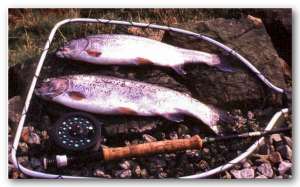AUTUMN FLY FISHING
I’m looking forward to the Autumn. The fishing begins to improve after the August Bank Holiday as the weather cools down, the daylight hours shorten and the casual ‘fair weather’ fisher-folk stay at home.
Looking through my fishing diaries I find that Autumn brings notonly more fish but bigger fish to the net. An entry for lateSeptember last year for a three hour session shows five rainbows withan aggregate weight of twenty two pounds. I would love that kind ofreturn for mid-August.

Which reminds me of how unpredictable trout can be and howgeneralisations can be so untrue on some occasions. Listening tofishery bailiffs over a period of years may lead one to suppose thatthey sometimes contradict themselves when discussing their water andtheir trout but what they are in fact doing is making adjustments forthe time of year, the wind, the temperature, the behaviour patternsof the fish and a dozen other pertinent factors. Thus, what holdstrue one day may be false the next – or even later the same day.
One of the waters I visit regularly has a very good stock of bothbrown and rainbows into double figures. I catch more rainbows thanbrowns probably because they are just in the majority. The ‘locals’tell me that rainbows are easier to hook than brown trout. On thisparticular day I was fishing quite near to a holding pen and Inoticed a shoal of rainbow trout busily feeding on the pellets thathad missed their intended target and dropped out of the cage on tothe lake bottom.
I cast a dark coloured GRHE nymph to the edge of the shoal and itwas soon taken by a large fish that came to the net quickly andwithout creating too much fuss. I released him and off he sprintedback to the feeding shoal. I repeated the same manoeuvre; cast to theedge and pulled the fish firmly the ten or twelve yards to the net.Again, the released trout could not get back quickly enough to hisfriends feeding on the pellets.
In all, I managed to hook, play and land half a dozen largerainbows, all between four and five pounds and in about three feet ofwater close to the bank. Were they all so pre-occupied with feedingfrenzy that they did not notice me so near on the bank or sense thefly line hitting the water? Did none of them see, or care, that theircolleagues were being hooked and then fighting hard to escape? Didnot the released fish communicate their distress when they returnedto the group? I only packed up fishing because I was exhausted andnot because the fish had taken fright and fled the scene. I reckon Icould have taken several more from the shoal.
I had a truly exhilarating session and, with this in mind, Ireturned to the same water a few days later. Nothing doing near theholding cages but there was plenty of action further out in thedeeper water. I got very good, strong takes but I lost eightconsecutive fish off the hook in an hour. They were mostly rainbowsin the two pound range. One or two fought ferociously and escapedafter a vigorous fight and almost within range of the landingnet.
I fish with barbless hooks but I could not blame that for thefailure to land a fish. I do not lose very many fish from the hook asa rule. It happens but not eight in a row!
The fish from the previous week fought well enough but why werethe fish so foolhardy and easily caught one day and the next time,under very similar conditions, so wily and elusive? That’s what keepstrout anglers returning time after time to the waterside.
RECOMMENDED
Wharfe Lake, Scorton, Lancashire
Northern anglers should consider joining the Lancashire branch ofthe Salmon & Trout Association. The Association has acquired asuperb water just off the Lancaster South Junction of the M6. It isknown as Wharfe Lake and is “U” shaped with a surround of leafy treeswhich do not interfere too much with casting.
The water is not very busy during the week and the plant andanimal life around the water is quite amazing. My first reaction wasthat I should have taken a gun along as well as the rod. There isgood car parking by the water at the end of the access lane and amember’s hut in case it rains very hard! That’s it! Out in the peaceand quiet surrounded by Mother Nature.
The lake is rather isolated but in a wooded setting just by theRiver Wyre. Members can fish day and night for £ 10 per sessionand take one fish a day. The rainbows are fast and fight strongly, somuch so that they require quite a lengthy stabilisation session onrelease.
The fish rise freely to small dry flies and small buzzers andlittle GRHE nymphs also induced some takes during my recent visits tothis fruitful and interesting water. I believe that the S&TAssociation is going to be netting in October and re-stocking fornext year.
Contact
Linda Martin (Hon. Secretary) 01200 423954 for membership of thelocal branch and for information about access to this water and otherbranch activities.













